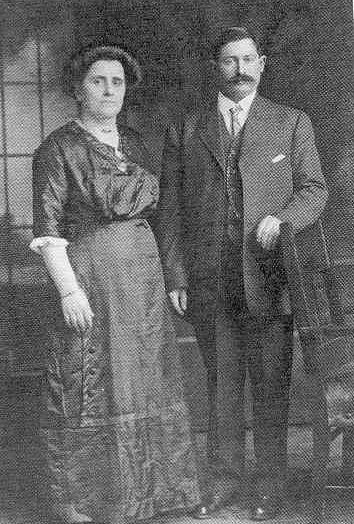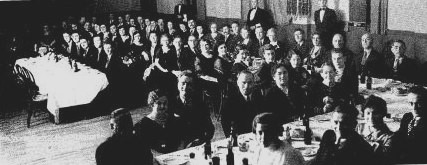|
Filippo Branca: Da Turbigo a Vancouver, British Columbia, Canada. di Ernesto R Milani 21 dicembre 2005 |
Filippo Branca : From Turbigo to Vancouver, British Columbia, Canada. by Ernesto R Milani December 21, 2005 |
|
|
Filippo Branca nacque a Turbigo nel 1870. Nel 1890 seguì le rotte dei Cuggionesi e lavorò nelle miniere di Iron Mountain. Michigan e di Herrin, Illinois. Si
trasferì poi nello Utah, a Castlegate a lavorare sempre nelle miniere di
carbone dove raggiunse altri lombardi e dove ris Nel frattempo si era sposato con Teresa Christopher (Cristoforo?) che aveva richiamato dall’Italia. Teresa era trentina e allora definita dagli americani sud-tirolese. Il figlio Joe nasce nel 1898. Filippo è alla ricerca di qualcosa e si sposta in California. Non ci resta molto e questa volta va più a nord in Canada reclutato dalle miniere di Dunsmuir per i suoi giacimenti vicini a Nanaimo, le Extension Mines sull’isola di Vancouver. Poco dopo sopraggiunse la corsa all'oro nel Klondike e Filippo fu tra gli ardimentosi. Tornò con un gruzzolo che si diceva intorno ai 10.00 dollari. Nel frattempo il campo minerario rinominato Ladysmith ridivenne la casa di Filippo Branca. Qualche mese dopo la scoperta di un giacimento di rame a una quindicina di chilometri da Ladysmith contribuì a cambiargli nuovamente la vita. Henry Crofton ( che dette poi il nome alla cittadina omonima) fu incaricato dal suocero Duismuir di organizzare il campo minerario e le attrezzature necessarie all’estrazione del minerale. Il company store ( Il negozio della compagnia) fu dato in gestione a un dipendente provvisto di capitale: Filippo Branca. La miniera funzionò per qualche tempo nonostante le difficoltà del territorio ma il successo fu minato dalle lotte intestine tra i proprietari e ben presto fallì per entrare nel numero delle tante città fantasma di cui è costellato l’ovest canadese. Filippo Branca aveva però subodorato qualcosa e se andò in tempo. Nel frattempo erano nati Ann nel 1901 e Angelo nel 1903. John nascerà nel 1906 e Giuseppe nel 1910 sarà battezzato con il nome del fratello morto il 27 settembre 1908. Filippo questa volta attraverso soltanto lo stretto e si stabilì a North Vancouver dalla parte opposta del Burrard Inlet. Correva l'anno 1903. Inizialmente aprì un negozio di generi alimentari ( grocery store) assieme a un piemontese di nome Giovanni Crosetti proprio sulla via principale ( Main Street ). Il sodalizio durò poco in quanto Filippo preferì aprire in proprio a North Vancouver sulla prima strada ( first street). Nel 1908 Filippo Branca tornò in Italia per motivi familiari. Era morto uno zio che era stato ministro delle finanze del regno d’Italia e Filippo aveva ereditato una parte delle sue fortune. Il 3 ottobre 1908 la nave La Lorraine attraccò al porto di New York da Le Havre. Filippo registrato come cittadino americano non ebbe molti fastidi ad Ellis Island. Prima di proseguire il viaggio per Vancouver si fermò all’Hotel Bertini al 154 di Bleecker Street nel cuore del Greenwich Village Italiano. Durante il viaggio in Italia, Filippo Branca aveva concepito l’idea di trasformare il suo business e di entrare nell’import-export di prodotti alimentari italiani. Il numero sempre crescente di Italiani ingaggiati a Chiasso dalla Corecco e Brivio e a Udine da Paretti si univa ai gruppi reclutati in Calabria. Miniere e ferrovie soprattutto la Canadian Pacific Railway avevano bisogno di un numero crescente di operai. E tutto questo si tramutava alla fine nella richiesta di prodotti della terra d’origine. Branca vendette il negozio di North Vancouver e apri nuovamente sulla Main Street dove il suo business all'ingrosso e al dettaglio sarebbe durato fino alla sua morte. Nel 1911 Branca acquistò 160 acri di terra a Burnaby per produrre verdura in proprio. Il terreno era vergine e non aveva bisogno di concime. I risultati furono eccellenti.
|
Filippo Branca was born in Turbigo, province of Milano in 1870. In 1890 he followed the route of the Cuggionesi and worked in the mines of Iron Mountain, Michigan and then in the coalmines of Herrin, Illinois. He then moved to Utah, at Castlegate where he joined other Lombards working in the coalmines and where he is also registered in the 1900 Federal Census. In the meantime he had married Teresa Christopher ( Cristoforo?) he had recalled from Italy. Teresa from Trentino and thus defined by Americans as South Tyrolean. His son Joe was born in 1908. Filippo is still looking for something different and heads for California. He stays there only for a short while and this time he ventures further north after being hired by the Dunsmuir mines for its coal deposits close to Nanaimo, the Extension Mines on Vancouver Island. Soon after the Gold Rush to Klondike started and Filippo was among the daring. He returned with an estimated hoard of more than 10,000 dollars. Then the mining camp now renamed Ladysmith became again Filippo Branca’s home. A few months after the discovery of a copper deposit about 15 kilometers from Ladysmith made him change his life again. Henry Crofton ( a town was named after him) was given the task by his father-in-law Dunsmuir to organize the mining camp with the necessary machinery to mine the mineral. The management of the company store was awarded to n employee with cash assets : Filippo Branca.
The mine operated for a while in spite of the difficulty of the territory but its success was undermined by internal strives and soon after failed and entered the numberless list of ghost towns that stud the Canadian West.
However Filippo Branca had suspected something and left on time. In the meantime Ann and Angelo were born , in 1901 and 1903 respectively. John was born in 1906 and Joseph, born in 1910 was baptized with the his brother’s name died on September 27, 1908. This time Filippo crossed only the strait and settled in North Vancouver on the opposite side of Burrard Inlet.
It was 1903. At first he opened a grocery store on Main Street in partnership with a Piedmontese named Giovanni Crosetti. The society didn’t last long since Filippo preferred to open his own store on North Street in North Vancouver.
In 1908 Filippo Branca returned to Italy for family reasons. He had inherited from an uncle who had been a finance minister of the Kingdom of Italy. On October 3, 1908 the ship Lorraine docked at new York Harbor from le Havre. Filippo, listed as an American citizen, had no problems at Ellis Island. Before continuing his journey to Vancouver he stopped at the hotel Bertini located at 154 Bleecker Street in the heart of the Italian Greenwich Village.
During his voyage to Italy Filippo had conceive the idea to transform his business and enter the the export-import of Italian food products.
The increasing number of Italians engaged in Chiasso by the Corecco and Brivio agency and in Udine by Paretti was augmented by the groups from Calabria.
The mines and most of all the Canadian PacificRailway needed more workers. And at the end all this turned into a request for product from the home-country. Branca sold his store in North Vancouver and re-opened on the Main Street of Vancouver where his wholesale and retail business would last until his death.
In 1911 Branca bought 160 acres of land in Burnaby to his own produce. The soil was untilled and needed no fertilizers. The results were excellent.
|
|
|
25° anniversario della Società Veneta, 1936. Al tavolo Filippo, Teresa, Angelo e Vincenzo Branca
The Veneta's Twenty-fifth anniversary, 1936. Head table: Filippo, Teresa, Angelo e Vincenzo Branca |
||
|
Sempre nel 1911 Branca costituì la Società Veneta con lo scopo di aiutare i soci sia economicamente sia socialmente. In realtà l’organizzazione divenne un veicolo di acculturazione al nuovo sistema di vita canadese. Lealtà verso il paese d’origine ma anche rispetto per il paese di adozione. Nel 1966 il figlio Angelo fonderà sulle orme del padre la Confratellanza Italo-Canadese con gli stessi scopi e attraverso l-unione di più società. Il 12 febbraio 1936 Filippo Branca fu applaudito in occasione del 25 anniversario di fonazione della Societa’ Veneta e gli fu riconosciuto il merito di avere contribuito al successo della comunità italo-canadese. Per anni era stato il punto di riferimento sia per i vecchi che per i nuovi migranti. Mori il 26 aprile 1939. Il figlio Angelo divenne giudice della Corte Suprema canadese ed è ancora ricordato come Il Gladiatore delle Aule di Tribunale. Anche la nipote Dolores Holmes è diventata giudice. Turbigo forse è soltanto un punto sulla cartina geografica. Quanti migranti hanno sovvertito il pronostico che li vedeva analfabeti, poveri, perdenti. Filippo Branca non risulta neanche dalle liste passeggeri di Ellis Island se non per il viaggio di ritorno. Nessun indizio a New York, Boston, Halifax, Baltimora, Boston, Philadelphia. Forse era un clandestino |
In the same year 1911 Branca established the Societa’ Veneta to help the members both economically and socially. Actually the association became a vehicle of acculturation into the new Canadian way of life. Loyalty towards the home-country but also respect for the adoptive country. In 1966 his son Angelo would follow his father footsteps to found the Confratellanza Italo-Candese with the same goals and through the union with various societies. On February 12, 1936 Filippo was cheered on occasion of the 25th anniversary of the Societa’ Veneta and his contribution to the success of the Italian-Canadian community was recognized. He had been for years the reference point of old and new migrants. He died on April 26 1939. His son Angelo became a judge of the Canadian Supreme Court and he is still remembered as the Gladiator of the Courts. Also his niece Dolores Holmes has become a judge. Turbigo maybe is only a dot in the map. How many migrants have beaten the odds that saw them as illiterates, poor and losers? Filippo Branca can’t even be found on the passenger lists of Ellis Island except for the return voyage. No clues in New York, Boston, Halifax, Baltimore and Philadelphia. Maybe he was a stowaway. |
|
 ulta
dal censimento del 1900.
ulta
dal censimento del 1900. 